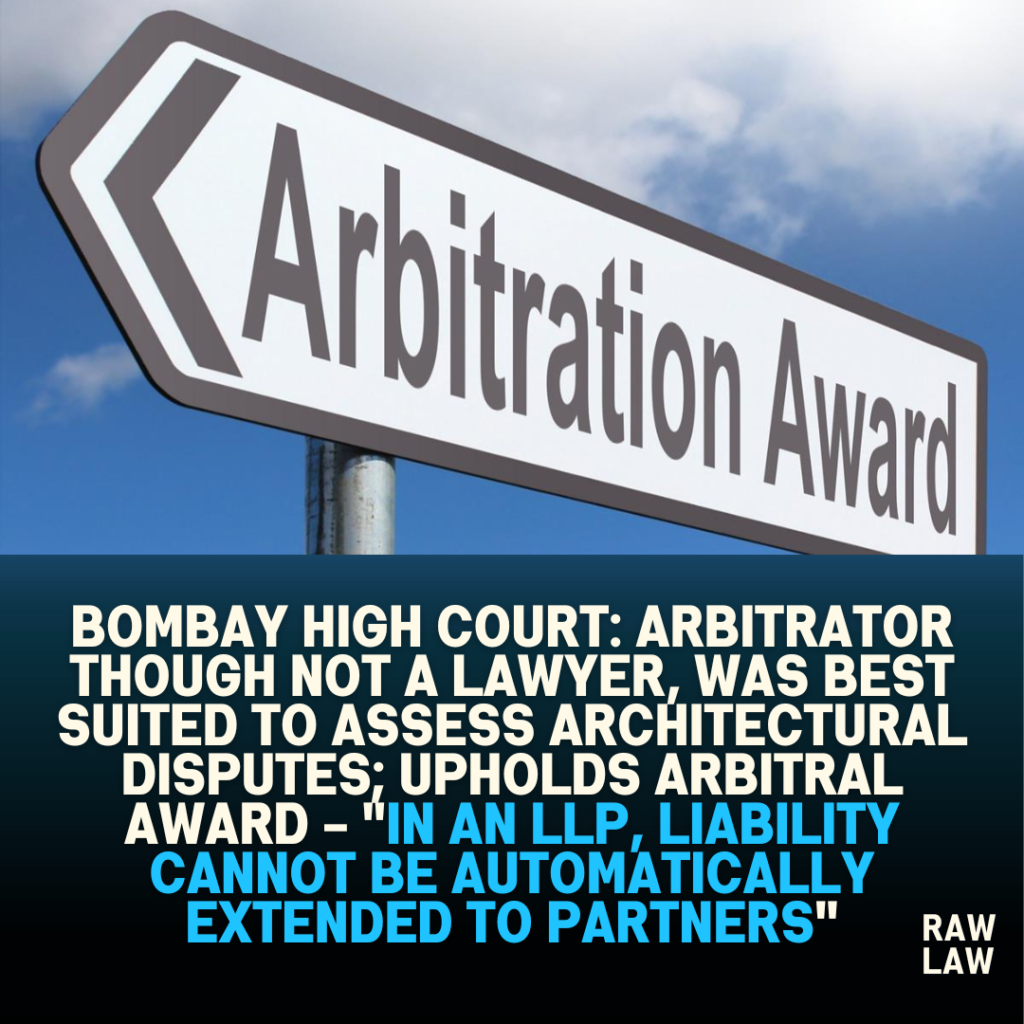Court’s Decision
The Bombay High Court dismissed a petition under Section 34 of the Arbitration and Conciliation Act, 1996 filed by Proteus Ventures LLP and its designated partners challenging an arbitral award dated August 16, 2024. The Court upheld the award directing Proteus to pay Archilab Designs approximately ₹88.08 lakhs with 18% interest and ₹24 lakhs for hardship/mental agony but set aside the part of the award making Proteus’ partners personally liable. Justice Somasekhar Sundaresan held: “Proteus has thrown the kitchen sink at the dispute attempting to frustrate every step that Archilab would adopt to recover its dues.”
Facts of the Case
- Proteus Ventures LLP engaged Archilab Designs for multiple projects under an agreement dated August 16, 2018, including works in Mumbai and Pune.
- Work worth ~₹3.93 crores was executed; Archilab received ~₹2.04 crores. Balance due was ~₹1.88 crores. Proteus admitted its liability by email dated April 23, 2019.
- A cheque of ₹30 lakhs issued by Proteus bounced; only a demand draft for the same sum was later given. The outstanding remained ~₹88.08 lakhs.
- Archilab invoked arbitration before the Council of Architecture as per Clause 23 of the Agreement.
- The arbitral tribunal awarded unpaid dues plus ₹24 lakhs towards damages/mental agony, holding Proteus and its designated partners jointly liable.
Issues
- Whether the arbitral award suffered from perversity or illegality under Section 34.
- Whether the designated partners of a limited liability partnership could be made personally liable under the “group company doctrine.”
- Whether damages for “mental agony” could be awarded in a commercial contract.
Petitioners’ Arguments (Proteus Ventures LLP & Partners)
- There was no valid arbitration agreement.
- The arbitrator lacked legal training and independence.
- The award wrongly imposed joint liability on partners, ignoring the principle of limited liability in LLPs.
- Damages for mental agony were impermissible in commercial disputes.
Respondent’s Arguments (Archilab Designs)
- Proteus admitted liability and even relied on the arbitration clause earlier to defeat MSME claims; it could not now deny existence of the agreement.
- The arbitrator, institutionally appointed by the Council, conducted proceedings fairly despite Proteus’ obstructive tactics.
- Damages were justified given Proteus’ unreasonable conduct, repeated delays, dishonoured cheque, and denial of site inspection.
Analysis of the Law
- Existence of Arbitration Agreement: Clause 23 expressly provided for arbitration before the Council. The Court held Proteus’ denial to be untenable, observing: “It cannot be countenanced that in each new forum, a new pleading of a new claimed truth can be adopted.”
- Group Company Doctrine & LLP Partners: The Court found the arbitral tribunal erred in roping in partners personally. In an LLP, liability cannot be automatically extended to partners. This portion of the award was severable and set aside.
- Damages & Mental Agony: Relying on Padmanabhan v. Natesan (SC, 2017), the Court upheld the award of ₹24 lakhs, noting the arbitrator rightly considered Proteus’ conduct in frustrating Archilab’s dues.
- Standard of Review: Referring to Dyna Technologies v. Crompton Greaves (2019) and Associate Builders v. DDA (2015), the Court reiterated that Section 34 courts cannot act as appellate forums and should respect even lay arbitrators’ findings when institutionally appointed.
Precedent Analysis
- Dyna Technologies Pvt. Ltd. v. Crompton Greaves Ltd. – AIR Online 2019 SC 1928: Courts should not interfere lightly with arbitral awards.
- Gayatri Balasamy v. ISG Novasoft Technologies Ltd. – 2025 INSC 605: Section 34 court can partially set aside severable parts of an award.
- Padmanabhan v. Natesan – Civil Appeal No. 16930/2017: Damages including for mental agony are permissible if supported by conduct.
- Associate Builders v. Delhi Development Authority – (2015) 3 SCC 49: Arbitrators are masters of evidence; courts must defer to plausible findings.
Court’s Reasoning
- The arbitral award was based on admitted dues, not conjecture. Proteus’ contradictory stands and obstructionist conduct revealed an attempt to “derail arbitration.”
- Mesh Co-Works was merely a brand of Proteus; the dispute over its “separate entity” status was a red herring.
- The arbitrator, though not a lawyer, was best suited to assess architectural disputes and had conducted proceedings with dignity and fairness.
- The only error was extending liability to partners personally, which the Court severed without disturbing the rest of the award.
Conclusion
The Court upheld the arbitral award directing Proteus to pay Archilab its unpaid dues of ~₹88.08 lakhs with 18% interest and damages of ₹24 lakhs. However, it set aside the imposition of personal liability on the designated partners, affirming: “The outcome is just, fair, reasonable and consistent with the contract between the parties.” The petition was dismissed with limited modification.
Implications
- LLP partners cannot be personally saddled with liability under arbitral awards unless expressly provided by law.
- Courts may partially sever arbitral awards to save them from invalidation.
- Even non-lawyer arbitrators institutionally appointed deserve deference, especially in technical disputes.
- Obstructionist tactics in arbitration may justify damages beyond contractual claims.



